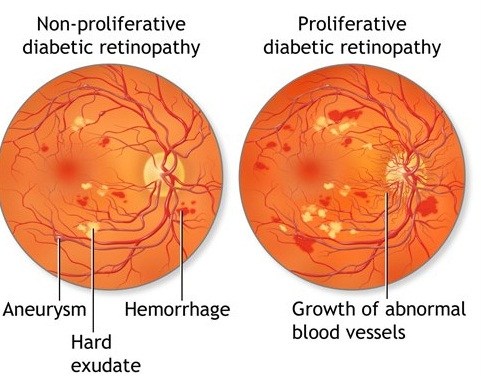Diabetic retinopathy (die-uh-BET-ik ret-ih-NOP-uh-thee) is a diabetes complication that affects eyes. It’s caused by damage to the blood vessels of the light-sensitive tissue at the back of the eye (retina). At first, diabetic retinopathy may cause no symptoms or only mild vision problems.
Diabetic Retinopathy
Diabetic Retinopathy
D
iabetic Retinopathy happens when high blood sugar damages blood vessels in the retina. When these blood vessels are damaged, they can leak fluid or bleed. This causes the retina to swell and form deposits. This is an early form of diabetic retinopathy called non-proliferative or background retinopathy.
In a later stage, called proliferative retinopathy, new blood vessels grow on the surface of the retina. These new blood vessels can lead to serious vision problems because they can break and bleed into the vitreous; the clear, jelly-like substance that fills the center of the eye. Proliferative retinopathy is a much more serious form of the disease and can lead to blindness.
Diabetic Retinopathy generally does not develop in diabetics until they have had diabetes for at least 10 years, but it is not wise to wait that long to have an eye exam. As soon as you’ve been diagnosed with diabetes, you need to have a dilated eye exam at least once a year.
Facts about Diabetes and the Eyes
- Diabetic retinopathy is the leading cause of blindness in working-age people
- Usually by the time diabetic patients recognize symptoms in their vision, the damage is severe, and many times irreversible.
- Having diabetes for a long time increases the chance for diabetic retinopathy.
- Almost all of those patients who have had diabetes for more than 30 years show signs of diabetic retinopathy.
- Diabetic retinopathy damage is permanent.
- Smoking and high blood pressure increase chances for diabetic retinopathy.
- The best measure to prevent diabetes damage in the eye is by keeping blood sugars low, and under control and having yearly dilated eye exams.
- Diabetic Retinopathy almost always affects both eyes.
- If you have diabetic retinopathy, you may need an eye exam more often. People with proliferative retinopathy can reduce their risk of blindness by 95 percent with timely treatment and appropriate follow-up care.
- Many cases of diabetes are diagnosed through a dilated eye exam.
To schedule your routine eye exam or free LASIK consultation at The Infinity Eye Care Center, please call (92) 344-2593661 or (92) 213-5865220 today.



